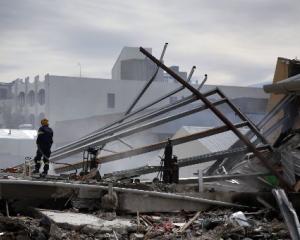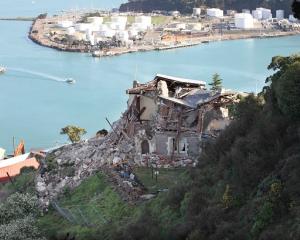Further earthquakes in Christchurch this week, following the pre-Christmas shakes, will not have given residents confidence their new year will be much improved on the previous 16 months.
As the damage continues to homes and businesses in our Southern neighbour, the costs also increase for owners and their insurers. An estimate last week indicated that Christchurch's February 2011 earthquake could cost $1.3 billion more than initially estimated.
And as the costs incurred rise inexorably so, too, will the cost of insurance. More than $US108 billion ($NZ139 billion) of global losses last year have stretched the resources of insurance companies worldwide.
While the industry is not at risk of a major collapse, New Zealanders will have to get used to rising premiums.
Although insurers have passed on a degree of risk through reinsurance, some companies have had to dig deep into their reserves, to avoid potential investor backlashes, were dividends to be reduced.
Reinsurance is the practice of insurers transferring portions of risk portfolios to other parties by some form of agreement in order to reduce the likelihood of having to pay a large obligation resulting from an insurance claim.
The intent of reinsurance is for an insurance company to reduce the risks associated with underwritten policies by spreading risks across alternative institutions. Reports last year indicated that some New Zealand companies and institutions were finding reinsurance harder to find, or at a more substantial cost.
The University of Otago says it will incur a significant financial hit to insure its $2.3 billion worth of building and contents assets next year. Premiums have risen by 62% in the wake of a response from international markets to the earthquakes in Christchurch.
Last year in addition to the ongoing financial crisis, which produced recessions or near recessions in developed countries, reinsurers and insurers also had to assimilate an exceptional accumulation of natural catastrophes globally.
Two of the most damaging earthquakes in recent times struck Japan - followed by a devastating tsunami - and New Zealand early last year, causing huge losses.
Several other significant events, including devastating floods in Thailand and Australia, a record breaking tornado season in the United States and Hurricane Irene making landfall along the East Coast of the United States, combined to cause insured losses of around $US108 billion in 2011.
Some reinsurers are starting to feel the financial squeeze of a tough 2011, and eventually the extra costs of the tougher times will find their way to the insurance bills paid by a majority of New Zealanders.
The Earthquake Commission coffers are looking more depleted than ever with the Nelson floods likely to drain more taxpayer-funded money out of the general fund. The commission handles claims for flood damage to land, or where landslips have damaged homes and properties, paying up to $100,000 plus GST on a dwelling.
The insurance industry expects to pay out millions of dollars in claims after the flooding and foul weather hit Nelson last month.
More concerning was the revelation that cases are being increasingly reported of people living without insurance. That became apparent during the early Christchurch earthquakes and the same trend is emerging from Nelson.
Global insurers are already starting to worry that this year will top 2011 for record weather disasters.
While it is too early to predict what 2012 will be like, insurers and weather prediction agencies point to a clear trend: the world's weather is becoming more extreme and more costly. The Insurance Journal reports that in some places rates are up sharply.
For instance, in Japan and New Zealand, rate hikes of more than 50% are common.
For all that, insurers are still making money, particularly because most of the disasters that have occurred have been in places where the risk is spread broadly among insurers. Where they are profitable, they can afford to be more flexible on price to retain business.
Another year of natural disasters will see that start to change. If more New Zealanders see their insurance bills increase substantially, some undoubtedly will take the risk of doing without.
An education campaign, perhaps led by the Insurance Council, could be the answer to what is sure to become an issue for 2012.






